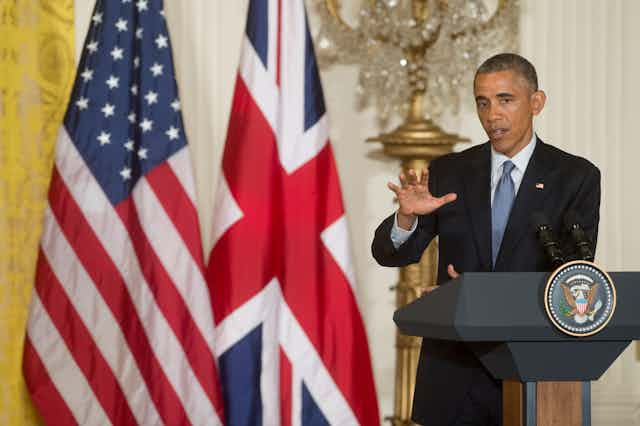Barack Obama’s visit to the UK in the middle of its EU referendum campaign has many questioning whether the US president should weigh into the Brexit referendum debate. But, as the UK’s biggest export market after the European Union, it is important to consider what effect a Brexit would have on US-UK trade.
As with all its trade relationships the UK would have to renegotiate its trade deals with the US, so there would be an immediate short-term impact. While trade will continue, in the short-term, investors would play a cautious waiting game to see the negotiated outcomes. This has a tendency to slow, if not derail, existing export-oriented businesses. In the longer-term, it is hard to say what the total impact would be, but it would likely weaken the UK’s bargaining power when it comes to negotiating its new relationship with the US.
A fundamental tenet of economics is that trade benefits all parties involved. And international trade has flourished over the years due to the many benefits it brings to different countries across the globe. Yet, countries don’t just haphazardly trade with any other country. Rather, they carefully select trading partners based on certain desirable attributes that help them maximise their benefits.

Economists often refer to the “gravity model of trade” to explain who and how much a country will trade with. According to this theory, the size of an economy is directly related to the volume of imports and exports. Larger economies produce more goods and services, so they have more to sell in the export market. Because larger economies generate more income from the goods and services they sell, they are in turn able to buy more imports.
Unsurprisingly then, among the top ten trading partners with the US are also the three largest European economies: Germany, the UK, and France. These countries have the largest gross domestic product (GDP) in Europe and, by leveraging on the EU market as a collective economy with an even bigger GDP and number of consumers, they can attract bigger economies, such as the US, as trading partners. Consequently, the US is Britain’s biggest export market after the EU – it bought more than US$54 billion in goods from the UK in 2014.
Size isn’t everything
It must be added, however, that the difference in trade volumes between nations is not influenced by the size of their economies alone. There are other factors such as the distance between markets, cultural affinity, geography, borders and trade agreements. It is therefore possible to argue that these other factors could create opportunities for the UK to enhance its trade relations with the US (and other countries) in event of Britain leaving the EU.
Those who support the stay in campaign have emphasised the relevance of the gravity model and argue for remaining part of the EU’s tariff-free trading bloc of 500m consumers. They believe that the collective bargaining power of the EU is stronger and more cost effective when compared to a scenario where the UK is outside the EU. Plus, the UK will have to renegotiate individual bilateral trade agreements if it leaves, including with the US. This is a daunting, expensive and long process.
The out campaign on the other hand emphasise Britain’s ability to forge its own deal with the EU. Michael Gove, leader of the campaign, said that Britain would form part of a non-EU European free trade zone. It can also negotiate bilateral deals with the US as a result of their “special relationship”. While the US does not seem keen on pursuing a separate free trade deal with the UK, the out campaign would argue that this rhetoric could well change in the event of a Brexit vote.
To be fair to this argument, it is true that eventually trade deals could be forged with the US in the event of a Brexit. Needless to say, however, outside the EU the UK is no longer part of the collective EU economy. It would therefore have a weaker gravitational pull and weaker bargaining power. And it would become much more reliant on its “special relationship” status to curry favour, alongside hoping for the speedy arrangement of the new trade deal.

